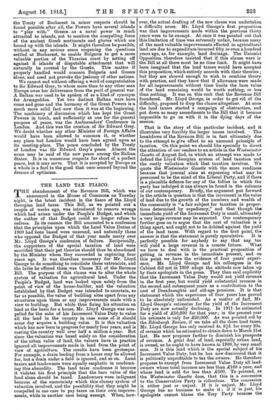TOPICS OF THE DAY.
THE PEACE.
IT seems certain that none of the Great Powers desires changes in the Treaty of Bucharest strongly enough to force a revision at the risk of provoking a new war. We may assume, therefore, that the Treaty will be accepted as it is, and, with the sanction of the Powers, will take the place of the Treaty of Berlin. Only one Great Power is seriously and conspicuously restless, and that is Austria-Hungary. But as Germany wears shining armour with quite as much insouciance when she helps to coerce Bulgaria in violation of all Austrian wishes as when she threatened Russia in order to gratify Austrian sentiment against Servia, we imagine that the Austrian Foreign Office will have to fall into line with the rest of Europe. Of course, Count Berchtold, if he does not resign his office, will make his new line of march sufficiently circuitous to avoid the appearance of a sudden retreat. The important fact is that the Bucharest Treaty, contrary to all expectations of a fortnight ago, unites the Great Powers nearly enough for them to give it their sanction as the form of peace approved of by the Concert. We have said from the beginning that the final peace would not be a peace of any durability or in any sense worthy of its name unless it carried the authority and prestige of the whole Concert. What, then, are we to say of this peace of Bucharest ? Simply that if it unites the Powers, as no other arrange- ment could unite them, it is a settlement that satisfies the main condition and must be accepted.
It satisfies the main condition, even though on countless minor points it courts criticism. On the face of it, the settlement of the boundary lines is not the one we should have wished. Distinctively Bulgarian towns in Macedonia —distinctively Bulgarian, at least, if the ethnographic argument is to be allowed any weight at all — pass into non-Bulgarian ownership; the withdrawal of Mace- donian territory is indeed a monstrous disappointment to Bulgaria ; and Greece has successfully pressed her claim to an unduly large slice of the Thracian coast. Because Bulgaria was helpless before her combined foes she has been deprived of rewards which were properly hers by right of the enormous sacrifices she made in the war against Turkey. We call this a bad arrangement in itself, because it is one which is bound to leave Bulgaria per- manently sore, and therefore a worse neighbour to Servia and Greece than she otherwise would have been. If Servia and Greece were able in their exultation to take a larger view of the future they would recognize that it would have been to their own interest to be satisfied with a little less than their pound of flesh. Bulgarian discontent may be a source of much expense and anxiety to them in the years to come. No doubt Bulgaria deserved a hard rap over the knuckles, but she did not deserve one so hard as this. We cannot help remarking that the secrecy which Bulgaria made a point of maintaining throughout the war was one of the causes of her undoing. She baffled Europe by a deliberately contrived system of misleading informa- tion, and, still following the policy of secrecy, she sprang a surprise attack on Greece and Servia which appears to have been a soldier's policy hatched apart from all the restraining influences of criticism at home and the sober warnings of onlookers abroad. The frankest publicity would have served her cause better. Thus we see how secrecy, in excessive or morbid forms, may defeat the very military ends which it was intended to serve. This is a lesson for everybody, however, and Bulgaria should not have been made to learn it alone. Sir Edward Grey, in his statement in the House of Commons on Tuesday, most wisely refused to single out any Balkan State for particular censure in the recent war of brothers.
The next important fact to notice about the Treaty of Bucharest is that it depends upon the observance of the Treaty of London. It is necessary to understand clearly what this means. If the Treaty of London which created the Enos-Midia line were successfully torn up by the Turks, Bulgaria would get even less—much less in the material value of territory—than she gets by the Treaty of Bucharest. It is essential, therefore, to remember that the acceptance of the Treaty of Bucharest by the Powers postulates the accomplishment of the Treaty of London. Otherwise the Treaty of Bucharest would not be defensible. Those who believe themselves to be acting as the friends of Turkey in this country ask why, if Greece and Servia were allowed to acquire new territory by conquest after the war between the Balkan Alliance and Turkey had been brought formally to an end, Turkey should not also be allowed to keep the territory she has reconquered. Besides, it is argued, Turkey has not really violated a treaty at all, as the Treaty of London had not been ratified. " You make one law for the Christian," it if said, " but another for the Turk. It is evident that the Turks would be allowed to remain wherever they are at the moment the men in possession—if only they were not Turks ! " Superficially, of course, there is undoubted logic in such an argument. But if we recognize that the Treaty of Bucharest is tolerable only because it assumes the operation of the Treaty of London—that is to say, the virtual retirement of the Turks from Europe—the logic: crumbles to pieces. Permission to the Turks to stay at Adrianople and in the surrounding towns might be compatible with some scheme which has never come into existence ; it is not compatible with the scheme that holds the field. Mr. Asquith said that the Balkan States could not conceivably be deprived of what they had won from the Turks, and we agree with him. We cannot contemplate the possibility of going back on that decision simply because a series of unforeseen events allowed the Turks, practically unopposed, to reoccupy territory from which they had been driven. This is not a question of serving Bulgarian interests so much as- of releasing a portion of Europe from Turkish rule in the interests of everybody. It will be said, of course, that the stories of atrocities prove that Bulgarians (Greeks and Servians, too, for that matter, if all the rumours are to be believed) are not more desirable rulers on the score of humanity than the Turks themselves. We cannot hope to test the conflicting stories of atrocities, but whatever the truth may be we take the general difference between Christian and Turkish atrocities to be this : that though the Christian peasants of the Balkan Peninsula may all be capable of cruelty when their blood is up, and the provocation has been great, no Christian Balkan State has ever exalted massacre into a policy in time of peace, whereas the Turks have notoriously done so. This is only too painfully proved by the Adana massacre and all the massacres of Armenians and Bulgarians in the past.
Turkey has been fairly warned that it will be in her own interest to retire behind the Enos-Midis line. If she does not do so she will forfeit the consideration of the Powers in all the financial arrangements which have yet to be made in connexion with her lost territories. She will also lose the support and sympathy of the Powers in her reconstruc- tion of her Asiatic empire. It is not to be supposed that reforms in Armenia are going to be wholly forgotten by Europe. Unless we are mistaken we shall hear a good deal about this question in the future. Europe will watch what happens with close concern. But if Turkey retained Adrianople and an important part of Thrace there would be very little prospect of Armenian reforms, or, indeed, of any solid progress in Asia Minor. Turkey would continue looking West instead of looking East. If troubles broke out in her Asiatic or Arabian territories the Powers could not be expected to exercise patience or lend her money. It would be much more likely that, all patience being exhausted, they would join in a scramble for partition. Great Britain has no interest in a partition of the Turkish Empire, and we should be very sorry to see it happen, but it is useless to disguise the fact that the possibility would be brought appreciably nearer if Turkey remained recalcitrant.ly at Adrianople. We are inclined to think on the whole that Turkey will give way. But it is to be remembered that if the coercion of Turkey by force actually became necessary it would be easy enough. Foreign ships could close the Dardanelles, and Turkey would probably lose her fleet, and perhaps her foothold in Europe altogether. We need not go into the question of Albania and the /Egea.n islands, as these present no obvious difficulties. Albania is to pass through a. transitional stage under the rule of a Commission into an independent principality, and as to the possession of the islands the Great Powers have passed a self-denying ordinance. Even Italy makes no claim to the islands she temporarily occupies. It should not be forgotten that if a friendly revision a the Treaty of Bucharest in minor respects should be found possible after all, the Powers have several islands to " play with." Greece as a naval power is much attracted to islands, not to mention the compelling force of the ancient Greek sentiments and glories which are bound up with the islands. It might therefore be possible, without in any serious sense reopening the questions settled at Bucharest, to enable Bulgaria to get a more valuable portion of the Thracian coast by setting off against it islands of disputable attachment that will naturally be coveted by the Greeks. This matter if properly handled would concern Bulgaria and Greece alone, and need not provoke the jealousy of other nations.
We cannot end without offering a word of congratulation to Sir Edward Grey, to whom more than to any other man Europe owes her deliverance from the peril of general war. A Balkan war used to be spoken of as a kind of synonym for Armageddon. Yet two distinct Balkan wars have come and gone and the harmony of the Great Powers is a much more solid fact now than it was at the beginning. The machinery of discussion which has kept the Great Powers in touch, and sufficiently at one for the general purpose of peace, was the Ambassadors' Conference in London. And this was the creation of Sir Edward Grey. We doubt whether any other Minister of Foreign Affairs would have been allowed to summon it, or whether any place but London would have been agreed upon as its meeting-place. The peace concluded by the Treaty of London was Sir Edward Grey's peace. Almost the same may be said of the new peace among the Balkan States. It is in numerous respects far short of a perfect peace, but it may serve. That it is accepted by Europe as a whole is a fact to the good that once seemed beyond the dreams of optimism.



































 Previous page
Previous page